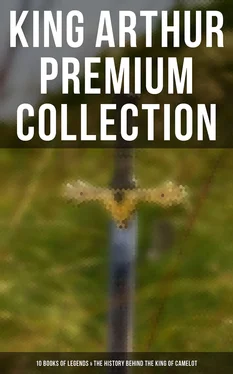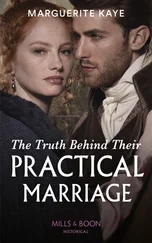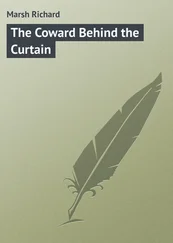Then came the queen unto Launcelot, and said: Will ye leave us at this high feast? Madam, said the gentlewoman, wit ye well he shall be with you to-morn by dinner time. If I wist, said the queen, that he should not be with us here to-morn he should not go with you by my good will. Right so departed Sir Launcelot with the gentlewoman, and rode until that he came into a forest and into a great valley, where they saw an abbey of nuns; and there was a squire ready and opened the gates, and so they entered and descended off their horses; and there came a fair fellowship about Sir Launcelot, and welcomed him, and were passing glad of his coming. And then they led him unto the Abbess’s chamber and unarmed him; and right so he was ware upon a bed lying two of his cousins, Sir Bors and Sir Lionel, and then he waked them; and when they saw him they made great joy. Sir, said Sir Bors unto Sir Launcelot, what adventure hath brought you hither, for we weened to-morn to have found you at Camelot? As God me help, said Sir Launcelot, a gentlewoman brought me hither, but I know not the cause.
In the meanwhile that they thus stood talking together, therein came twelve nuns that brought with them Galahad, the which was passing fair and well made, that unnethe in the world men might not find his match: and all those ladies wept. Sir, said they all, we bring you here this child the which we have nourished, and we pray you to make him a knight, for of a more worthier man’s hand may he not receive the order of knighthood. Sir Launcelot beheld the young squire and saw him seemly and demure as a dove, with all manner of good features, that he weened of his age never to have seen so fair a man of form. Then said Sir Launcelot: Cometh this desire of himself? He and all they said yea. Then shall he, said Sir Launcelot, receive the high order of knighthood as to-morn at the reverence of the high feast. That night Sir Launcelot had passing good cheer; and on the morn at the hour of prime, at Galahad’s desire, he made him knight and said: God make him a good man, for of beauty faileth you not as any that liveth.
Chapter II.
How the letters were found written in the Siege Perilous and of the marvellous adventure of the sword in a stone.
Table of Contents
Now fair sir, said Sir Launcelot, will ye come with me unto the court of King Arthur? Nay, said he, I will not go with you as at this time. Then he departed from them and took his two cousins with him, and so they came unto Camelot by the hour of underne on Whitsunday. By that time the king and the queen were gone to the minster to hear their service. Then the king and the queen were passing glad of Sir Bors and Sir Lionel, and so was all the fellowship. So when the king and all the knights were come from service, the barons espied in the sieges of the Round Table all about, written with golden letters: Here ought to sit he, and he ought to sit here. And thus they went so long till that they came to the Siege Perilous, where they found letters newly written of gold which said: Four hundred winters and four and fifty accomplished after the passion of our Lord Jesu Christ ought this siege to be fulfilled. Then all they said: This is a marvellous thing and an adventurous. In the name of God, said Sir Launcelot; and then accompted the term of the writing from the birth of our Lord unto that day. It seemeth me said Sir Launcelot, this siege ought to be fulfilled this same day, for this is the feast of Pentecost after the four hundred and four and fifty year; and if it would please all parties, I would none of these letters were seen this day, till he be come that ought to enchieve this adventure. Then made they to ordain a cloth of silk, for to cover these letters in the Siege Perilous.
Then the king bade haste unto dinner. Sir, said Sir Kay the Steward, if ye go now unto your meat ye shall break your old custom of your court, for ye have not used on this day to sit at your meat or that ye have seen some adventure. Ye say sooth, said the king, but I had so great joy of Sir Launcelot and of his cousins, which be come to the court whole and sound, so that I bethought me not of mine old custom. So, as they stood speaking, in came a squire and said unto the king: Sir, I bring unto you marvellous tidings. What be they? said the king. Sir, there is here beneath at the river a great stone which I saw fleet above the water, and therein I saw sticking a sword. The king said: I will see that marvel. So all the knights went with him, and when they came to the river they found there a stone fleeting, as it were of red marble, and therein stuck a fair rich sword, and in the pommel thereof were precious stones wrought with subtle letters of gold. Then the barons read the letters which said in this wise: Never shall man take me hence, but only he by whose side I ought to hang, and he shall be the best knight of the world.
When the king had seen the letters, he said unto Sir Launcelot: Fair Sir, this sword ought to be yours, for I am sure ye be the best knight of the world. Then Sir Launcelot answered full soberly: Certes, sir, it is not my sword; also, Sir, wit ye well I have no hardiness to set my hand to it, for it longed not to hang by my side. Also, who that assayeth to take the sword and faileth of it, he shall receive a wound by that sword that he shall not be whole long after. And I will that ye wit that this same day shall the adventures of the Sangreal, that is called the Holy Vessel, begin
Chapter III.
How Sir Gawaine assayed to draw out the sword, and how an old man brought in Galahad.
Table of Contents
Now, fair nephew, said the king unto Sir Gawaine, assay ye, for my love. Sir, he said, save your good grace I shall not do that. Sir, said the king, assay to take the sword and at my commandment. Sir, said Gawaine, your commandment I will obey. And therewith he took up the sword by the handles, but he might not stir it. I thank you, said the king to Sir Gawaine. My lord Sir Gawaine, said Sir Launcelot, now wit ye well this sword shall touch you so sore that ye shall will ye had never set your hand thereto for the best castle of this realm. Sir, he said, I might not withsay mine uncle’s will and commandment. But when the king heard this he repented it much, and said unto Sir Percivale that he should assay, for his love. And he said: Gladly, for to bear Sir Gawaine fellowship. And therewith he set his hand on the sword and drew it strongly, but he might not move it. Then were there no 12 more that durst be so hardy to set their hands thereto. Now may ye go to your dinner, said Sir Kay unto the king, for a marvellous adventure have ye seen. So the king and all went unto the court, and every knight knew his own place, and set him therein, and young men that were knights served them.
So when they were served, and all sieges fulfilled save only the Siege Perilous, anon there befell a marvellous adventure, that all the doors and windows of the palace shut by themself. Not for then the hall was not greatly darked; and therewith they were[*] all[*] abashed both one and other. Then King Arthur spake first and said: By God, fair fellows and lords, we have seen this day marvels, but or night I suppose we shall see greater marvels.
In the meanwhile came in a good old man, and an ancient, clothed all in white, and there was no knight knew from whence he came. And with him he brought a young knight, both on foot, in red arms, without sword or shield, save a scabbard hanging by his side. And these words he said: Peace be with you, fair lords. Then the old man said unto Arthur: Sir, I bring here a young knight, the which is of king’s lineage, and of the kindred of Joseph of Aramathie, whereby the marvels of this court, and of strange realms, shall be fully accomplished.
12.Omitted by Caxton, supplied from W. de Worde.
Читать дальше












